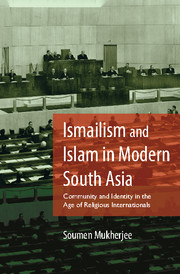 Ismailism and Islam in Modern South Asia
Ismailism and Islam in Modern South Asia Book contents
- Frontmatter
- Contents
- Acknowledgements
- List of Abbreviations
- Glossary
- Note on Transliteration
- Introduction
- 1 The Khoja Ismailis and Legal Polemics Religion and Customs in Nineteenth Century Bombay
- 2 The Howardian Moment Morality, Aryanism and Scholarship
- 3 Pan-Islamism and an Asiatic Spirit Postnational Subjectivities in an Age of ‘Transition’
- 4 The Hazir Imam, Ismailism and Islam in Late Colonial South Asia
- 5 The Importance of Being Ismaili Religious Normativity and the Ismaili International in the Age of Global Assemblages
- Concluding Reflections
- Select Bibliography
- Index
5 - The Importance of Being Ismaili Religious Normativity and the Ismaili International in the Age of Global Assemblages
Published online by Cambridge University Press: 23 July 2017
- Frontmatter
- Contents
- Acknowledgements
- List of Abbreviations
- Glossary
- Note on Transliteration
- Introduction
- 1 The Khoja Ismailis and Legal Polemics Religion and Customs in Nineteenth Century Bombay
- 2 The Howardian Moment Morality, Aryanism and Scholarship
- 3 Pan-Islamism and an Asiatic Spirit Postnational Subjectivities in an Age of ‘Transition’
- 4 The Hazir Imam, Ismailism and Islam in Late Colonial South Asia
- 5 The Importance of Being Ismaili Religious Normativity and the Ismaili International in the Age of Global Assemblages
- Concluding Reflections
- Select Bibliography
- Index
Summary
The headship of a religious community spread over a considerable part of the world surface—from Cape Town to Kashgar, from Syria to Singapore—cannot be sustained in accordance with any cut-and-dried system. Moral conditions, material facilities, national aspirations and outlook, and profoundly differing historical backgrounds have to be borne vastly in mind, and necessary mental adjustments made …
Syria, Iran, and the North-west Frontier Province of Pakistan are all countries with their strongly marked individuality, historical background, and traditions. These historical variations over centuries, and the accessibility, or lack of it, of many of the more isolated communities, and the development of communications between my family and my followers have all had their effect …
The correspondence which I maintain with all these far-scattered communities is affected by local circumstances.
His Highness Aga Khan III, 1954Writing in 1954 in a fast decolonizing post-World War II context, Aga Khan III thus went on to elaborate what he thought to be the distinctive feature of his Ismaili community. Elaborating on the protean nature of the community, the above observation thus expatiates on his general notion of fluidity of Ismailism that we have cited in the epigraph of the ‘Introduction’ to this book. The Aga Khan further added that the system of administration sustaining this global community had also been commensurately fluid, ranging from ‘a highly developed and civilized administrative system of councils’ in ‘the British, Portuguese and French colonies of East Africa, Uganda, Portuguese East Africa, Madagascar, Natal and Cape Colony’, administering a wide gamut of educational, property, executive and judicial matters. In India, Pakistan, Burma and Malaya, a similar structure holds the community together, while in Central Asia, Afghanistan, parts of Russia and Chinese Turkestan, certain families, or sometimes even hereditary chieftains or secular rulers (but themselves Ismaili) such as in Hunza, function as the Imam's representatives and administrators connecting the myriad localities to the Imamate.
Understandably, the importance of being Imami Ismaili is premised first and foremost on the basis of a belief in the spiritual guidance of the Imam of the time drawing upon an essentially pluralized and dynamic understanding of Islam, sensitized at once to the postnational subjectivities as well as the variegated administrative structures, which stem from the global locations of the community.
- Type
- Chapter
- Information
- Ismailism and Islam in Modern South AsiaCommunity and Identity in the Age of Religious Internationals, pp. 146 - 172Publisher: Cambridge University PressPrint publication year: 2016


